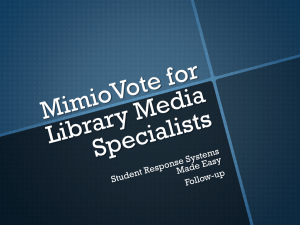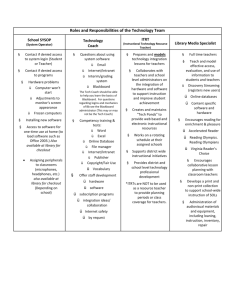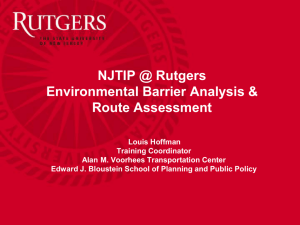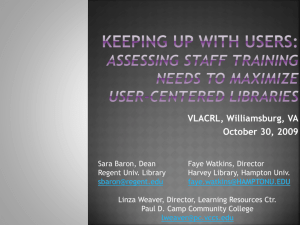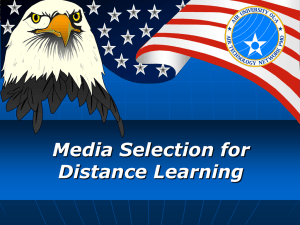Teaching via VTC
advertisement
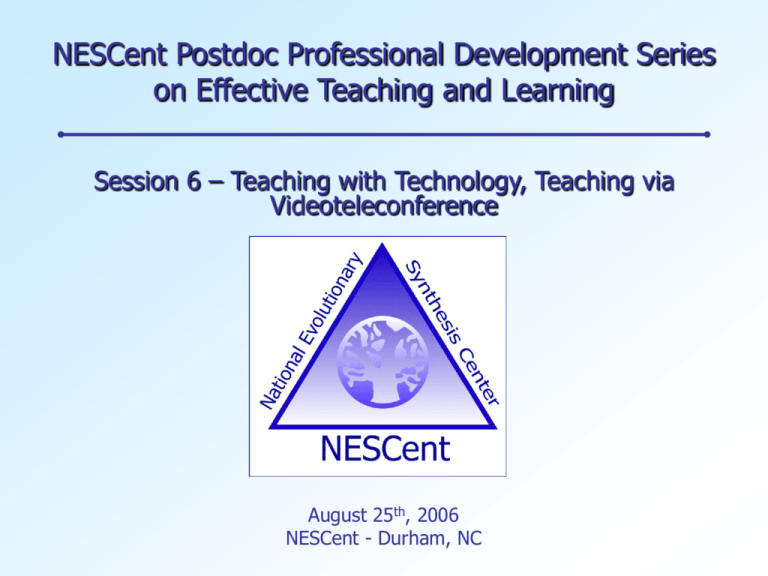
NESCent Postdoc Professional Development Series on Effective Teaching and Learning Session 6 – Teaching with Technology, Teaching via Videoteleconference August 25th, 2006 NESCent - Durham, NC “…in the winter of 1813-1814 . . . I attended a mathematical school kept in Boston . . . on entering his room, we were struck at the appearance of an ample black board suspended on the wall, with lumps of chalk on a ledge below, and cloths hanging at either side. I had never heard of such a thing before.” - May, 1866 Overview • General Thoughts on Teaching with Technology • Barriers to Teaching with Technology • Types of Instructional Technology • Demo: Teaching via Videoteleconference (VTC) • Resources General Thoughts on TwT • Avoid the “George Mallory” approach (“…because it is there”) • Technology should enhance the learning process…ideally it should enable the instructor and/or student to do things that couldn’t be done otherwise • Know your students and their resources and skills • Blend technology into your class • Remember the “Seven Principles for Good Practice in Undergraduate Education” Barriers to TwT • Infrastructure – – – – • • • • Cost to establish Cost to maintain Cost to upgrade (remain on the cutting edge) Physical constraints Faculty resistance Student resistance Student access Resources for faculty, student training Types of Instructional Technology • Basic Tools – Powerpoint – Film clips and animations – Websites and web resources • Course Management Software (e.g., Blackboard) – Integrated suite of tools for course management – Announcements, document posting/sharing, discussion boards, online gradebook, group pages, online quizzes and surveys, etc. Types of Instructional Technology • Basic Tools – Powerpoint – Film clips and animations – Websites and web resources • Course Management Software (e.g., Blackboard) – Integrated suite of tools for course management – Announcements, document posting/sharing, discussion boards, online gradebook, group pages, online quizzes and surveys, etc. • Advanced Tools – – – – – Electronic whiteboards Tablet PCs Student response systems (SRS) iPods Etc. SMARTBoard Touch-sensitive, electronic whiteboard Tablet PCs Sympodium Student Response Systems Types of Instructional Technology • Basic Tools – Powerpoint – Film clips and animations – Websites and web resources • Course Management Software (e.g., Blackboard) – Integrated suite of tools for course management – Announcements, document posting/sharing, discussion boards, online gradebook, group pages, online quizzes and surveys, etc. • Advanced Tools (electronic whiteboards, tablet PCs, SRSs, iPods, etc.) • Distance Education Technology – Asynchronous tools (“online courses”) – Synchronous tools (videoteleconferencing (VTC), webconferencing) – “Blended Learning” approaches Videoteleconference (VTC) Classrooms Videoteleconference (VTC) Classrooms Demo: Teaching via VTC Some Good Resources… • Teaching with Technology (2000) David G. Brown, editor • Web Teaching Guide: A Practical Approach to Creating Course Websites (2000) Sarah Horton • The ‘No Significant Difference’ Phenomenon (1999) Thomas L. Russell • “How to Improve Critical Thinking Using Instructional Technology” (2001) Timothy van Gelder (http://www.philosophy.unimelb.edu.au/reason/papers/ASCILITE2001.pdf) Additional Online Resources… • EDUCAUSE - EDUCAUSE focuses on the use of information resources in higher education. (http://www.educause.edu/) • Horizon - "The environmental scanning publication for education leaders" (http://horizon.unc.edu/main.asp) • The TLT Group - A non-profit group focusing on effectively using technology to enhance teaching and learning (http://www.tltgroup.org/) • Teaching and Learning on the WWW - Over 605 examples of how the Web is being used as a medium for learning. (http://www.mcli.dist.maricopa.edu/tl/)
